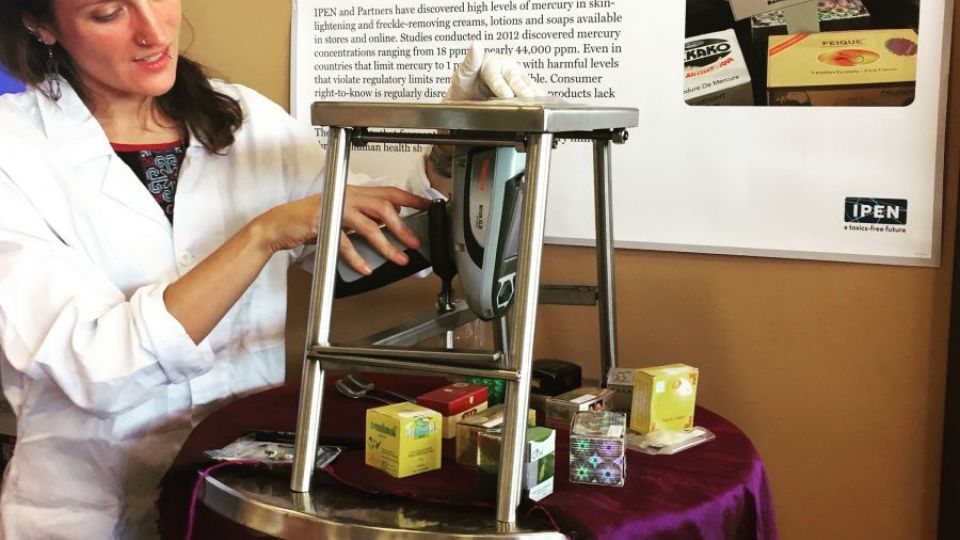Until Friday, international convention on reducing mercury leaks caused by human activity takes place in Geneva. The representatives of states and intergovernmental and non-governmental organizations from all over the world negotiate on the first meeting of the Conference of the Parties to the Minamata Convention on decreasing the mercury pollution and protection of human health. The convention regulates a wide range of products containing this metal which production, import and export should be completely banned by 2020. In the Czech Republic, mercury has been used until this year in chlorine production; it also leaks into the surrounding environment during the coal combustion in thermal power stations mostly.
Minamata convention, which is binding for the Czech Republic since this September, banns among other things using mercury in certain products from 2020 on. These products include some types of batteries, lamps such as compact fluorescent lamp, mercury tilt switches, soaps and cosmetics, thermometers and blood pressure calculators. In accordance with the Convention's requirements to reduce the mercury use in dental fillings, European Union will restrict the use of amalgam fillings for children, pregnant and breastfeeding women from next July on.
In the Czech Republic, one of the biggest polluters is Spolana factory in Neratovice. Until November 30th it is allowed to use amalgam electrolysis for chlorine and sodium hydroxide production. From December a new technology of production of PVC from externally imported materials should be launched. Unipetrol company, the owner of Spolana, is also planning to sanitize in an eco-friendly manner the decommissioned operation. It wasn't until this year when Spolchemie from Ústí nad Labem (another big local chemical plant that used to use mercury) switched to an alternative chlorine production. Under both operations high levels of mercury in fish were repeatedly measured.
A less known case is a contamination of fish population in Skalka dam near Cheb. The fish here are more affected by the contamination than those around Neratovice. The blame is on German factory in Marktredwitz, today already decommissioned and decontaminated, where herbicides based on mercury were produced until 1985. Back then, it contaminated also the sediments along Reslava river, Ohře's tributary, which supplies Skalka dam with water. Until now, the Reslava sediments haven't been cleaned from mercury.
The Minamata Convention is the first global legally binding agreement that regulates mercury contamination of environment. The final document was approved by 140 countries in 2013 and until today it has been ratified by 83 of them. Although the harmful effect of mercury on human health is known for more than half a century, the states have only recently undertaken to regulate its industrial use. Signatory states also undertook to treat considerately the waste contaminated by mercury, which leaks into soil, water, air and subsequently into food chain.
The Convention doesn't address all the problems
The Convention paradoxically doesn't deal adequately with the contaminated areas remediation process. This part of the Convention is only voluntary. However, speedy guidebook on how to identify and manage the contaminated areas might improve the situation. "Arnika and International Persistent Organic Pollutants Elimination Network (IPEN) prepared a proposal of such a document and submitted it last year on the Minamata Convention preparatory meeting. Recently a range of countries involved as parties to the Convention recommended it as a supporting document", says Jindřich Petrlík, Arnika's chairman. "Hopefully, European Union won't cause any further obstructions in adoption of the document. The guidebook is important mostly for developing countries to which it will be of a help during eliminating of polluted areas".
Mercury is highly toxic for human body. It harms the nervous system, kidneys and cardiovascular system. It has a strong impact on human foetus and its nervous system. It comes into body with food, typically fish, and as mercury vapours during gold mining. According to American Environmental Protection Agency, as little as one thousandth per mil of mercury in hair may cause brain damage during foetal development.
The Arnika association has been participating in research on toxic substances pollution in the Czech Republic on a long-term basis. To the Geneva conference, we brought a device that can measure the contents of mercury in a product. "The delegates will see the actual contents of lightening beauty creams which are extremely popular in Asiatic and African countries", says Jitka Straková, Arnika's specialist on toxic substances. As a part of international cooperation, the organization helped take samples in other EU countries as well as in Kazakhstan and Thailand. The outcomes of international research have become the resource material of a global study presented in January 2013 on one of the Minamata Convention preparatory sessions.







